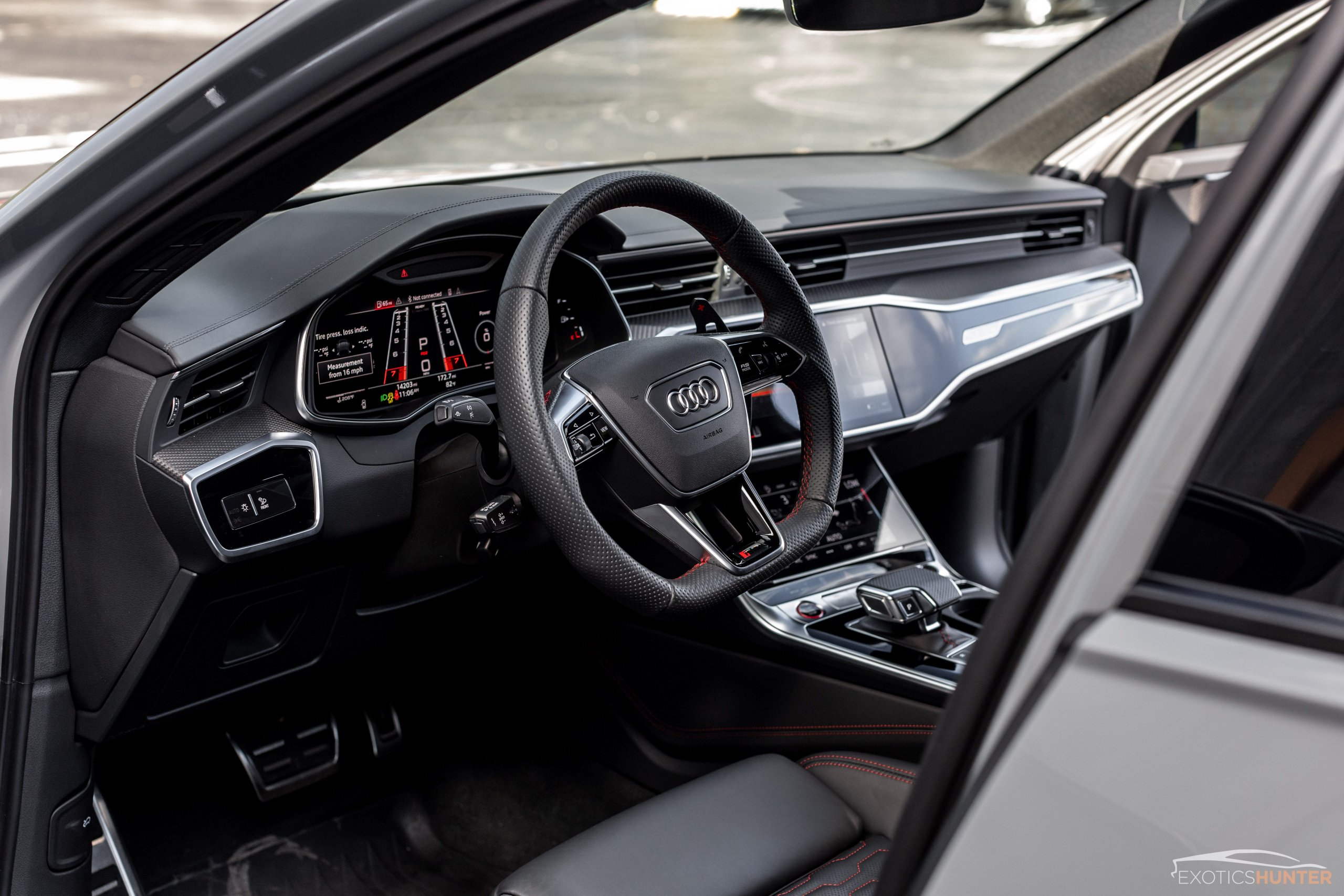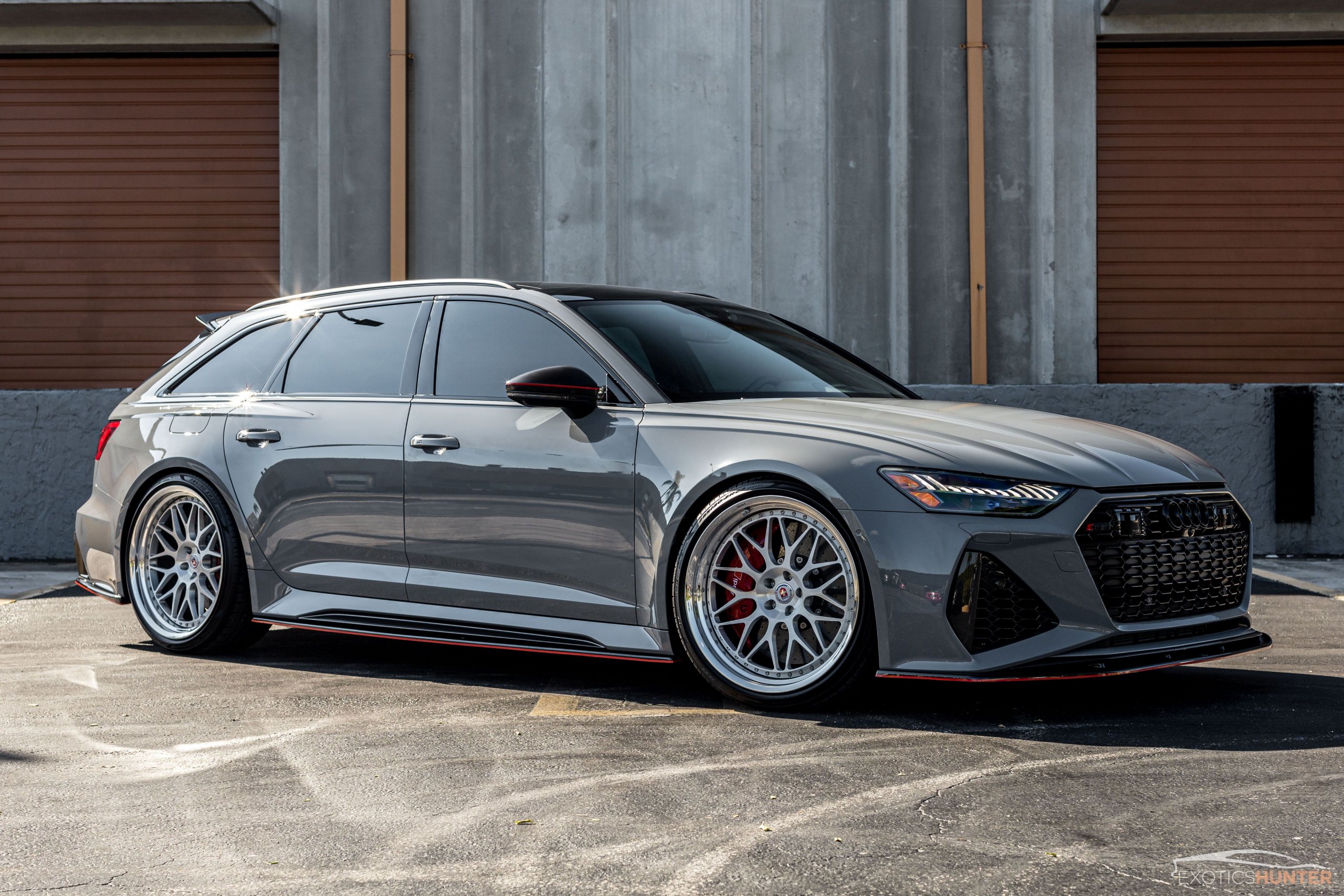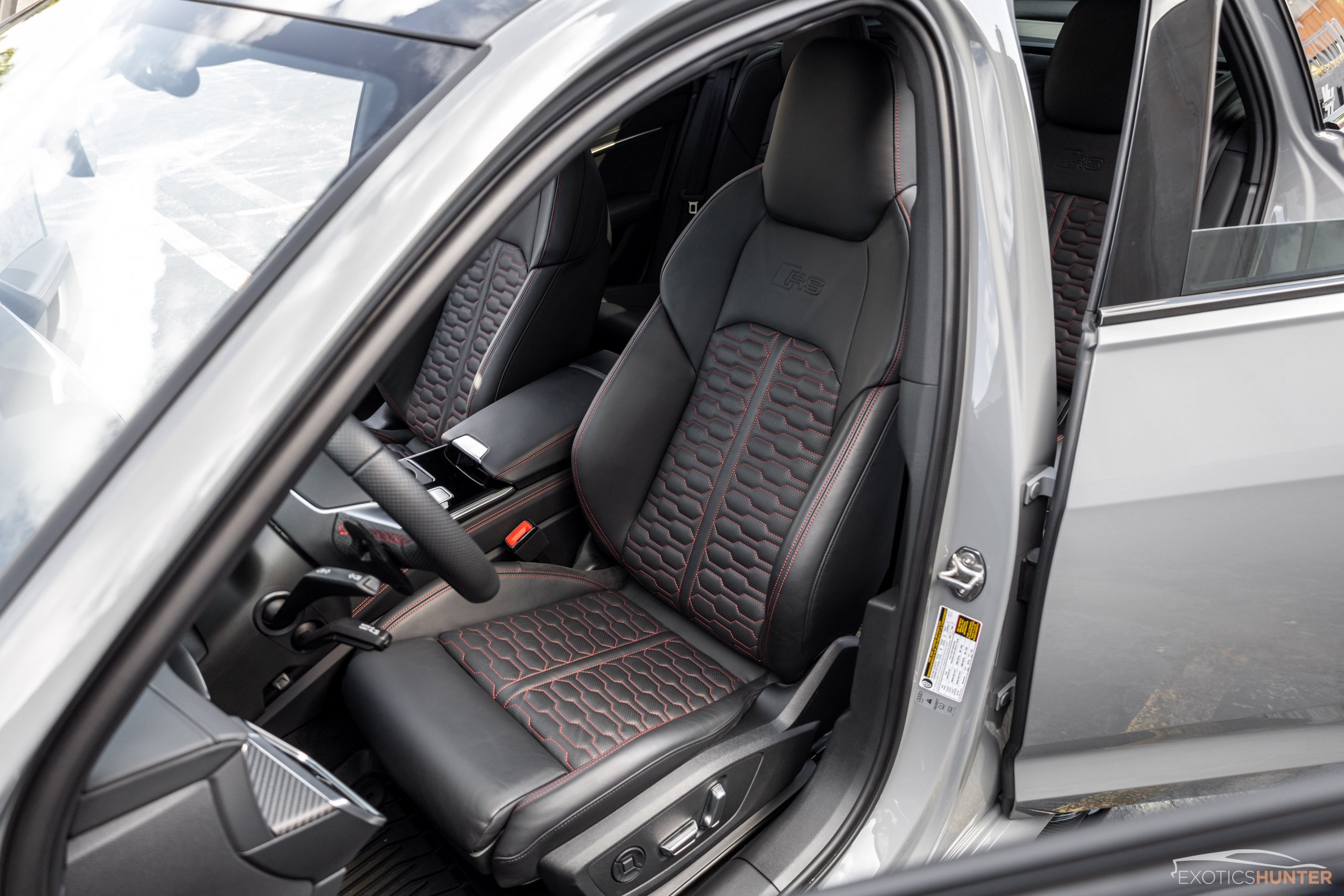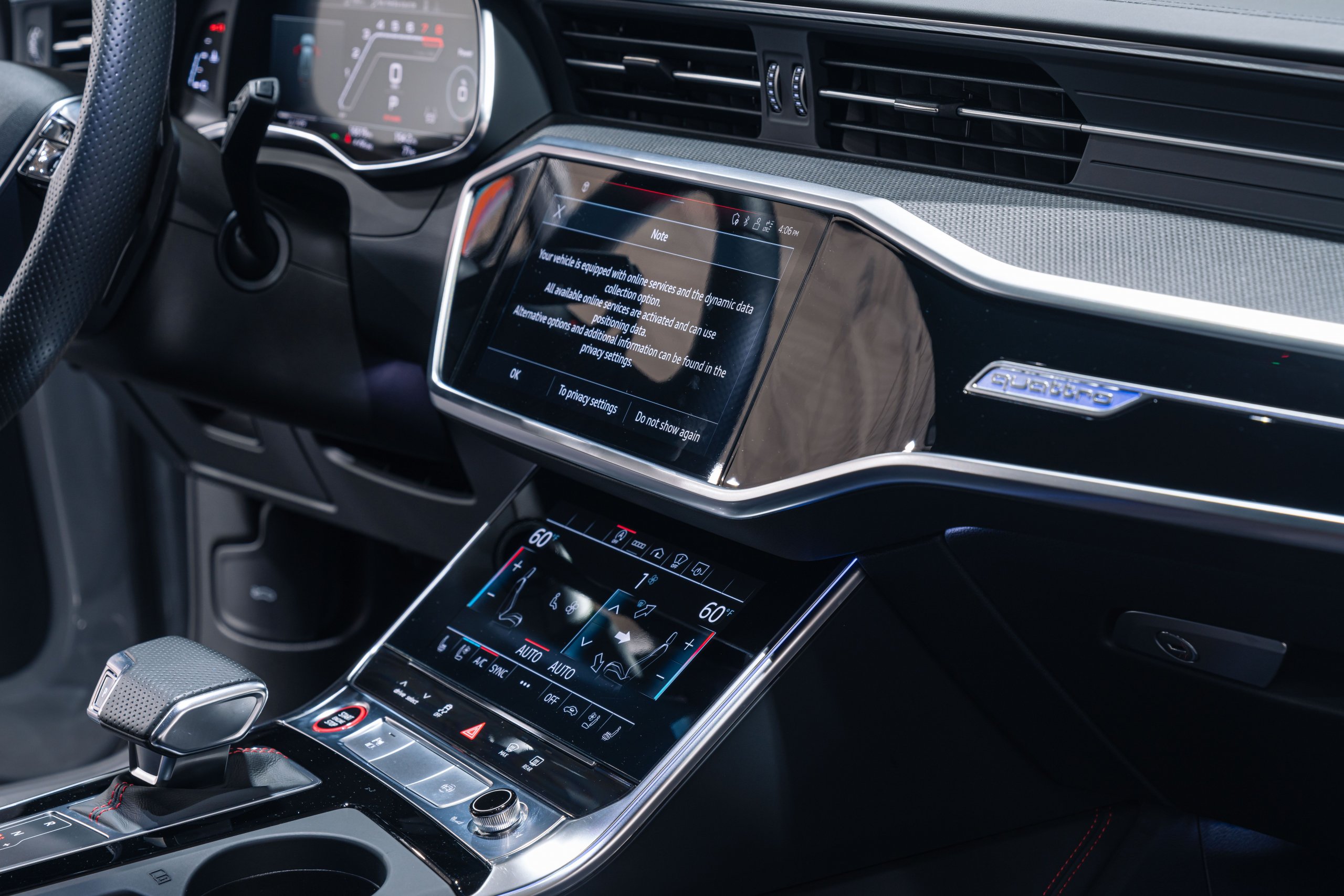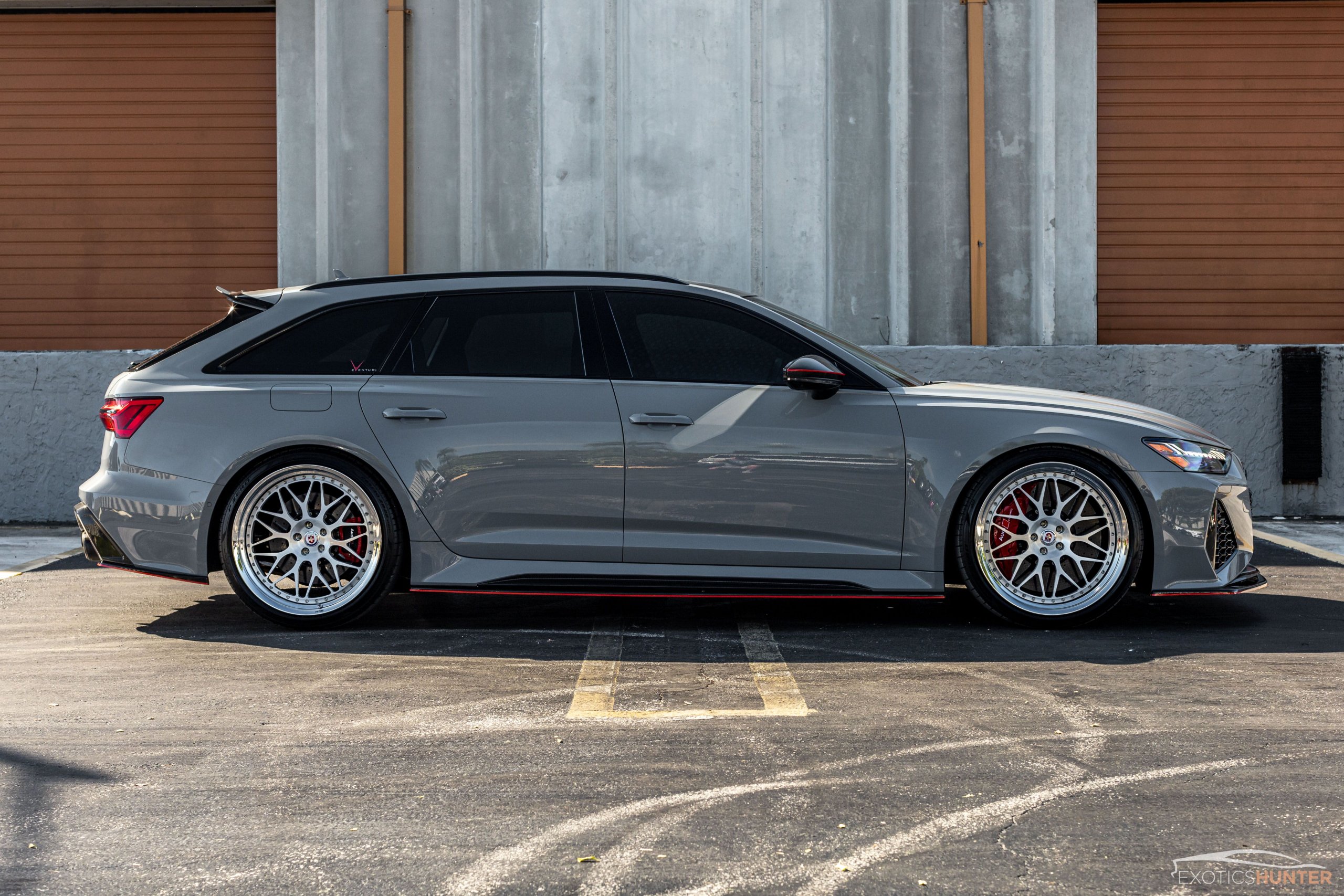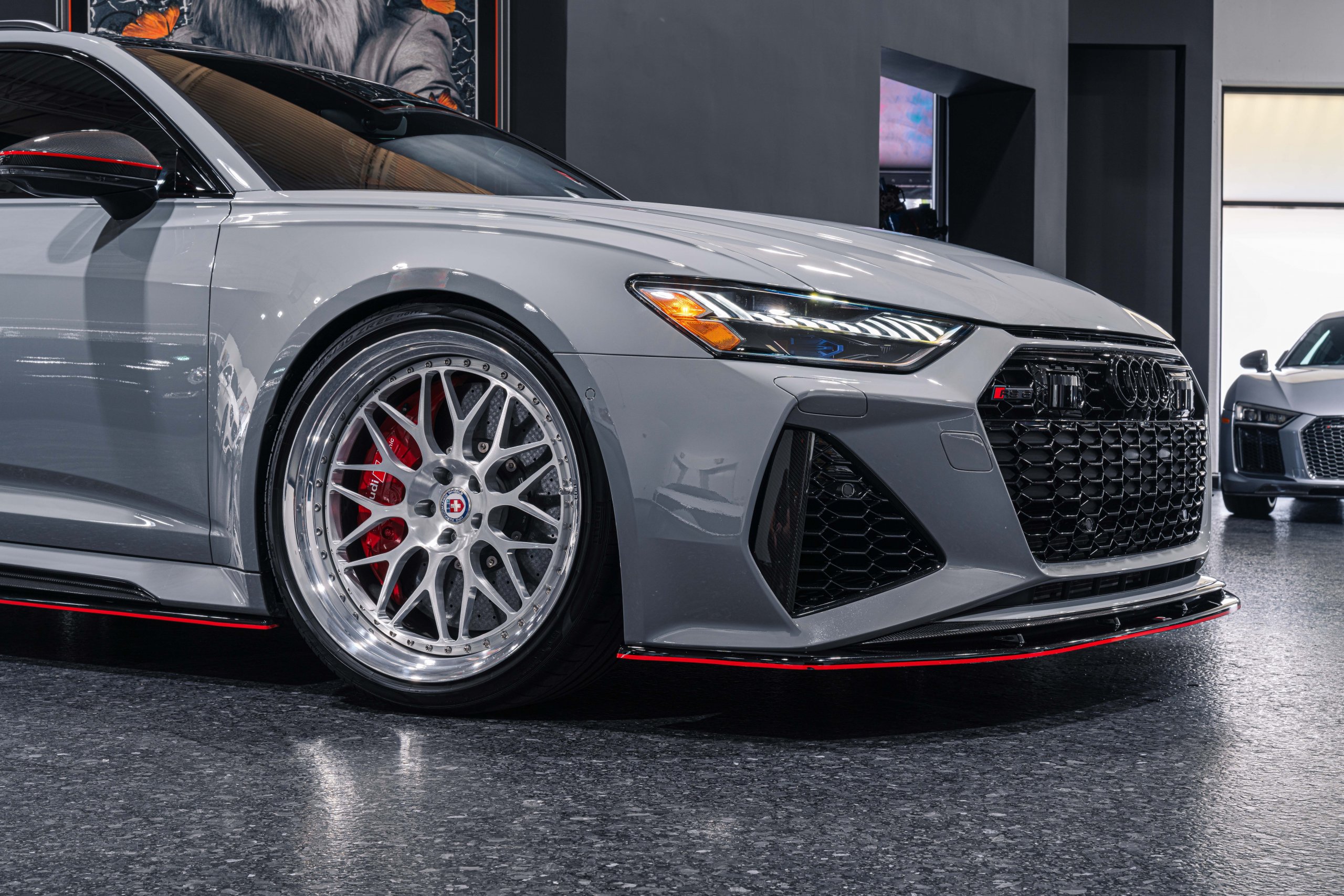When the Fourth Generation Audi RS6 (C8, 2019–present) was introduced, it marked a bold return to the U.S. market, reigniting excitement among enthusiasts after a prolonged absence since the first-generation RS6.
At its heart lies a twin-turbocharged 4.0-liter V8 engine paired with a 48-volt mild-hybrid system. This powerhouse delivers an impressive 591 hp and 590 lb-ft of torque, enabling the RS6 to rocket from 0 to 60 mph in just 3.5 seconds. Audi’s legendary Quattro all-wheel-drive system ensures this power is harnessed effectively, providing exceptional grip and control in all conditions.
The exterior design of the RS6 Avant has a wide, muscular stance accentuated by flared wheel arches that house massive 21-inch wheels (or optional 22-inch wheels). The front fascia features a bold single frame grille, matrix LED headlights with laser light technology and large air intakes. At the rear, it comes with a sculpted diffuser and dual oval exhaust outlets.
Inside, the RS6 Avant offers premium materials such as Valcona leather, carbon-fiber trim, and brushed aluminum. The fully digital MMI Touch Response system integrates two high-resolution touchscreens for intuitive control of the car’s infotainment and climate systems.
Audi’s Virtual Cockpit Plus provides a customizable digital gauge cluster, and optional RS-specific displays enhance the high-performance driving experience. The spacious interior also includes practical elements like generous cargo space and split-folding rear seats, making the RS6 uniquely versatile.
In its segment, the RS6 Avant competes with rivals such as the Mercedes-AMG E63 S, Porsche Panamera Turbo S Sport Turismo, and BMW M5. Despite the competition, the RS6 distinguishes itself with its iconic Avant body style, a perfect blend of family-friendly utility and uncompromising performance.
Model Changes (Breakdown by Year)
2020 Audi RS6
In 2020, the Audi RS6 Avant made a triumphant debut, establishing itself as a benchmark in the high-performance luxury wagon segment.
At its core was a twin-turbocharged 4.0-liter V8 engine, delivering an impressive 591 hp and 590 lb-ft of torque. This powerhouse was paired with Audi’s renowned quattro all-wheel-drive system and an eight-speed automatic transmission, ensuring seamless power delivery and superior traction in all conditions.
The exterior design of the RS6 Avant featured a striking wide-body aesthetic, with flared wheel arches that accentuated its muscular stance.
Inside, the cabin was a showcase of premium craftsmanship, combining luxurious materials with state-of-the-art technology. Audi’s MMI Touch Response system was a standout feature, providing an intuitive and modern interface for controlling the car’s infotainment and climate settings.
The 2020 Audi RS6 Avant entered the U.S. market with a starting price of $109,000.
2021 Audi RS6
In 2021, the Audi RS6 Avant carried forward without introducing any significant changes.
The starting price remained the same as the previous year at $109,000.
2022 Audi RS6
In 2022, the Audi RS6 Avant received a series of updates focused on color, trim, and personalization. One of the notable changes was the replacement of Navarra Blue with the vibrant Ultra Blue in the color palette, adding a fresh option to the exterior lineup.
The RS Design Package was introduced, offering red or gray accents that included striking colored seatbelt borders and RS-branded floor mats with contrast stitching, adding a sporty flair to the interior. Additionally, a flat-bottom steering wheel became standard.
Audi also updated the RS6 Avant’s standard interior inlays to Carbon Twill, enhancing the cabin’s premium aesthetic and feel. Dynamic Ride Control (DRC) suspension was made available, offering improved handling and ride quality, although it experienced delayed availability during the model year.
The 2022 Audi RS6 Avant had a starting price of approximately $116,500.
2023 Audi RS6
In 2023, Audi took the RS6 Avant to the next level with the introduction of the Performance model.
This variant featured a more potent iteration of the twin-turbocharged 4.0-liter V8 engine, now capable of producing an impressive 621 hp and 627 lb-ft of torque. These enhancements were achieved through the use of larger turbochargers and an increase in boost pressure by 3 psi, resulting in a significant improvement in overall performance.
The Performance model’s increased power translated to quicker acceleration, reducing the 0-60 mph time to a blistering 3.3 seconds. To further enhance agility and driving dynamics, Audi implemented weight-saving measures by removing 17 pounds of sound-deadening material.
The 2023 Audi RS6 Avant had a starting price of approximately $121,900. And the Performance variant started at approximately $126,500.
2024 Audi RS6
In 2024, the Audi RS6 Avant Performance model carried forward the impressive enhancements introduced in the previous year.
The 2024 Audi RS6 Avant Performance has a starting price of approximately $125,800.
Audi RS6 Common Problems
While the fourth-generation Audi RS6 (C8, 2019–present) is celebrated for its outstanding performance, features, and practicality, like any high-performance vehicle, it is not without its challenges. Owners have reported a handful of recurring issues that, while not universal, are worth considering for prospective buyers. These concerns primarily revolve around electrical systems, mechanical components, and advanced features, which can sometimes lead to costly repairs if not addressed promptly. Below is a breakdown of the most common problems associated with the RS6.
Keep in mind, that it is essential that all cars, even supercars, can have issues and it is crucial to perform a Pre-Purchase Inspection (PPI) from an authorized dealer or experienced independent mechanic to reveal all issues.
Electrical System Malfunctions: Some owners have experienced warnings related to electrical system failures and sport differential malfunctions. These issues can cause multiple warning lights to illuminate on the dashboard, though the vehicle often continues to operate normally. In certain cases, the engine may shut down unexpectedly, requiring a restart to resume normal function.
Alternator Failures: There have been reports of alternator issues leading to battery charging problems and potential vehicle shutdowns. This problem has caused hesitation among potential buyers, as it can result in unexpected breakdowns.
Driver Assistance System Errors: Some RS6 owners have reported the loss of driver assistance functionalities, particularly during adverse weather conditions like heavy rain. These malfunctions can lead to the temporary unavailability of features such as adaptive cruise control and lane-keeping assist.
Turbocharger Concerns: The RS6’s twin-turbocharged engine is designed for high performance, but issues with the turbochargers have been noted. Problems can include reduced power output and unusual noises, potentially leading to costly repairs if not addressed promptly.
Suspension and Air Ride Problems: Owners have reported issues with the RS6’s suspension system, including premature wear of components and air suspension failures. These problems can result in a less comfortable ride and may require significant repair work.
Recalls
2021 Audi RS6 vehicles
Service brakes, hydraulic: Fluid (Recall no. 23V601000)
An incorrectly labeled brake fluid cap may have been installed, which can result in the use of the wrong type of brake fluid. Incorrect brake fluid can reduce braking ability and increase the risk of a crash.
2021 to 2022 Audi RS6 vehicles
Electrical system (Recall no. 22V861000)
Liquid spilled in the rear seat may penetrate and cause the gateway control module to shut down. A gateway control module shutdown will suddenly reduce engine power, increasing the risk of a crash.
2022 Audi RS6 vehicles
Back over prevention: Display function (Recall no. 22V806000)
The infotainment main unit may become damaged internally when the vehicle is shut off, resulting in an inoperative rearview camera display the next time the vehicle is started. As such, these vehicles fail to comply with the requirements of Federal Motor Vehicle Safety Standard number 111, “Rear Visibility.” An inoperative rearview camera display reduces the driver’s rear visibility, increasing the risk of a crash.
2021 Audi RS6 vehicles
Back over prevention: Display function (Recall no. 22V742000)
Due to a software issue, a blank or black screen may be displayed instead of the rearview camera image when the vehicle is placed in reverse gear. As such, these vehicles fail to comply with the requirements of Federal Motor Vehicle Safety Standard number 111, “Rear Visibility.” A blank rearview camera display can reduce the driver’s rear visibility, increasing the risk of a crash.
2021 to 2022 Audi RS6 vehicles
Electrical system: Instrument panel: Fuel gauge: Fuel level float/sensor/sending unit (Recall no. 22V155000)
The fuel level sender may stick, causing an inaccurate fuel level reading to be displayed on the instrument cluster. An inaccurate fuel reading may cause an engine stall due to lack of fuel, increasing the risk of a crash.
2021 Audi RS6 vehicles
Suspension: Rear: Axle: Non-powered axle assembly (Recall no. 22V034000)
The rear axle alignment may not have been inspected after the repairs for Recall 21V-295 (42L1) were performed. Rear axle misalignment may cause premature or uneven tire wear, increasing the risk of a crash.
2022 Audi RS6 vehicles
Back over prevention: sensing system: camera (Recall no. 21V825000)
A software error may prevent the rear-view image from initially displaying when the vehicle begins to reverse. As such, these vehicles fail to comply with the requirements of Federal Motor Vehicle Safety Standard number 111, “Rear Visibility.” A rear-view camera that does not display an image reduces the driver’s rear view, increasing the risk of a crash.
2021 Audi RS6 vehicles
Seat belts (Recall no. 21V606000)
The rear seat belt automatic locking retractors may deactivate early, which can prevent the child restraint system from securing properly. As such, these vehicles fail to comply with the requirements of Federal Motor Vehicle Safety Standard number 208, “Occupant Crash Protection.” An unsecured child restraint system can increase the risk of injury during a crash.
2021 Audi RS6 vehicles
Engine (Recall no. 21V339000)
Cracks may develop on the surface of the engine cylinder bore. Cracks may cause engine damage and a stall or an oil leak, increasing the risk of a crash or fire.
2021 Audi RS6 vehicles
Suspension: Rear: Axle: Non-powered axle assembly (Recall no. 21V295000)
The lock nut on the trailing arm of the rear axle may break due to stress corrosion. A broken lock nut may misalign the rear axle, causing a loss of control and increasing the risk of a crash.
2021 Audi RS6 vehicles
Air bags (Recall no. 21V159000)
The score line on the passenger air bag may not have been manufactured correctly. An incorrectly manufactured air bag may not deploy properly, and could also eject plastic debris into the passenger compartment, increasing the risk of injury during a crash.
2021 Audi RS6 vehicles
Electrical system (Recall no. 20V749000)
The electrical connector can detach from the door crash sensor in either of the front doors. A detached connector can delay the activation of the restraint systems, including the side air bag, curtain air bag and/or seat-belt pretensioners during a side impact crash, increasing the risk of injury.
Maintenance and Ownership Costs
The Audi RS6 is a reliable performance wagon that you can rely on and has relatively low maintenance requirements.
However, it is important to remember that regular maintenance and repairs will still be necessary, and the costs can vary depending on whether you take your car to a dealer or an independent mechanic.
Here are the suggested service schedules and intervals per Audi:
Every 10,000 Miles or 12 Months
- Engine Oil and Filter Change
- Brake System Inspection (including brake pad thickness)
- Multi-Point Inspection
- Service Reminder Indicator Reset
- Tire Repair Kit Check (if equipped)
Every 20,000 Miles or 24 Months
- Engine Oil and Filter Change
- Includes all items from the 10,000-mile service
- Visual Inspection for Paint Damage and Corrosion
- Brake System Check for Damage and Leaks
- Engine Cooling System Check (freeze protection and coolant levels)
- Lubrication of Door Hinges and Latches
- Inspection of Lights and Electrical Components
Every 30,000 Miles or 36 Months
- Engine Oil and Filter Change
- Brake System Inspection (including hoses and pads)
- Cabin Air Filter Replacement
- Check of Engine and Transmission for Leaks
Every 40,000 Miles or 48 Months
- Engine Oil and Filter Change
- Vehicle Inspection for Leaks, Wear, and Corrosion
- Engine Cooling System Inspection
- Brake Fluid Replacement
Every 50,000 Miles or 60 Months
- Engine Oil and Filter Change
- Rear Differential Oil Change
- Transfer Case Fluid Replacement
- Comprehensive Inspection of All Major Systems
Every 60,000 Miles or 72 Months
- Engine Oil and Filter Change
- Spark Plug Replacement
- Engine Air Filter Replacement
- Cabin Air Filter Replacement
- Remote Key Battery Replacement
Here is a rough estimate of typical service costs associated with the Audi RS6:
- Oil Change – Expect to pay as low as $100 at independent mechanics and around $180 at dealerships. This service typically includes an oil and filter change using the recommended high-quality synthetic oil.
- Minor Service – Includes oil and filter changes, brake system inspections, and multi-point inspections. Costs are roughly $220 at dealerships, with independent shops offering similar pricing.
- Major Service – Includes all minor service items plus additional tasks like spark plug replacement, brake fluid change, and air filter replacement. Dealerships typically charge around $807, while independent shops may charge slightly less or about the same.
- Tires – A set of high-performance tires, such as Michelin PS4 or similar, will cost approximately $2,000. Pricing may vary depending on the brand and dealer or shop you choose.
- Brakes – Front brake rotors and pads (non-carbon ceramic) will cost around $1,243.92 to $1,841.83 at dealerships. Independent shops may offer the same service for about $1,042. Carbon ceramic brakes, if equipped, are designed for long life but may cost significantly more to replace.
- Clutch – The RS6 uses an automatic transmission, and clutch replacements are generally not a concern. The transmission is designed to last the vehicle’s lifetime with proper care, resulting in minimal to no expenses for clutch or flywheel service.
Options List
When it comes to purchasing a Fourth Generation Audi RS6 Avant (C8, 2019–present), understanding the options list is important.
For those wanting enhanced dynamic driving capabilities, the RS6 Avant Performance model offers further refinements, including advanced tuning and improved responsiveness. Additionally, the Dynamic Ride Control (DRC) suspension is available, providing better handling and reduced body roll for a more engaging and confident driving experience.
The RS6 Avant’s aggressive design can be further enhanced with optional 22-inch wheels, available in a variety of finishes, and the Black Optic Package, which replaces chrome elements with black accents for a sportier look.
For those who want to stand out, the Carbon Optic Package adds carbon-fiber accents to the front splitter, side skirts, and rear diffuser. Other notable exterior options include matrix LED headlights with laser light technology, which improve nighttime visibility and give the RS6 a futuristic appearance. Buyers can also opt for red-painted brake calipers to give it an extra pop.
Inside, the RS Design Package offers red or gray accents, including contrast stitching, colored seatbelts, and unique RS floor mats. For audiophiles, the Bang & Olufsen Advanced Sound System provides an immersive listening experience with 23 speakers and 3D sound capabilities.
For those who want to focus on comfort, options like ventilated front seats with massage functionality and a panoramic sunroof are available to enhance the overall driving experience.
The RS6 also offers a head-up display and RS-specific displays in the Virtual Cockpit, providing the driver with performance data.
For buyers who desire a truly one-of-a-kind RS6 Avant, Audi’s Exclusive Program allows for special-order customization of exterior paint colors, including unique matte and metallic finishes, as well as bespoke interior trims and materials.
Key Options
- RS Design Package (Red or Gray Accents)
- Black Optic Package
- Carbon Optic Package
- Bang & Olufsen Advanced 3D Sound System
- Audi Exclusive Customization Program
Audi RS6 Prices and Values
The Best Audi RS6 to Buy
When it comes to choosing the best Audi RS6 Avant (C8, 2019–present), your decision will depend on several key factors.
For enthusiasts seeking the pinnacle of the C8 RS6 lineup, the 2023 RS6 Avant Performance model is the standout choice. As an evolution of the already-impressive RS6 Avant, the Performance variant features significant enhancements.
Its twin-turbocharged 4.0-liter V8 engine produces 621 horsepower and 627 lb-ft of torque—an increase over earlier models—thanks to larger turbochargers and increased boost pressure.
These changes improve acceleration, with a 0-60 mph time of just 3.3 seconds. The Performance model also benefits from a 17-pound weight reduction achieved by removing sound-deadening material, enhancing agility and responsiveness without compromising luxury.
The 2023 RS6 Avant Performance also offers an array of optional features that make it highly customizable. Popular packages like the Black Optic Package and Carbon Optic Package add a distinctive, sporty aesthetic with blacked-out or carbon-fiber exterior elements.
Inside, options such as the RS Design Package (offering red or gray accents), ventilated and massaging seats, and the Bang & Olufsen Advanced 3D Sound System elevate the car’s luxury and exclusivity.
For market stability, the 2019 to 2022 model years are good for hacking.
In addition to selecting the right model year and options, it is important to assess the condition and mileage of the vehicle. Low-mileage RS6 with full-service histories are more likely to retain their value and ensure a trouble-free ownership experience.
Conclusion
In summary, with a starting price of around $105,000+, the Audi RS6 Avant is an exceptional choice for those seeking a high-performance luxury wagon. It combines a striking wagon design, technology, and everyday practicality, making it a standout in its class.
While competitors like the Mercedes-AMG E63 S, Porsche Panamera Turbo S Sport Turismo, and BMW M5 exist, the RS6 sets itself apart with its iconic Avant body style, advanced all-wheel-drive system, and unmatched versatility.
For those seeking a perfect blend of luxury, performance, and practicality, the Audi RS6 Avant is a top choice that excels in both driving dynamics and everyday usability.
Car Hacking Shortcuts
- Look for models with Black Optic or Carbon Optic Packages
- Opt for the RS6 Avant Performance model for its improved performance.
- Model years 2019 to 2022 are good for hacking
- Prioritize well-maintained, low-mileage vehicles with a full-service history
- Any RS6 with Audi Exclusive exterior or interior is desirable


